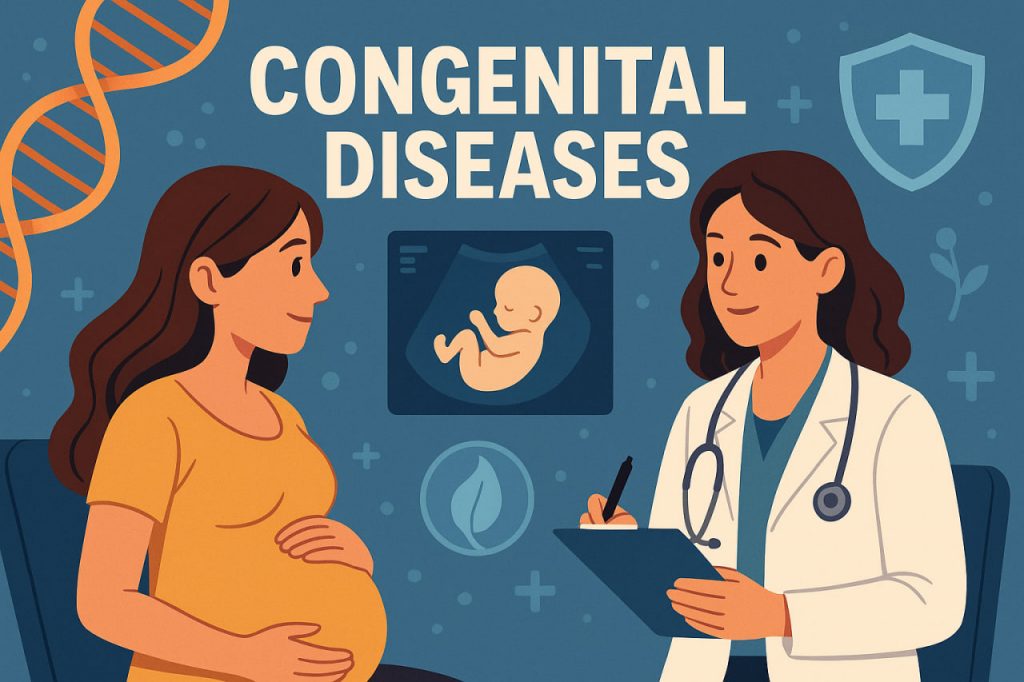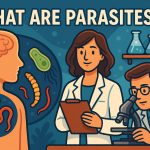Congenital diseases, often called birth defects or congenital disorders, are medical conditions that exist from the moment of birth. These conditions may arise from genetic mutations, chromosomal abnormalities, or environmental influences that affect the developing fetus. While the term may sound alarming, not all congenital conditions are severe—some are mild or even asymptomatic. Understanding their causes, types, and potential prevention strategies is crucial for improving healthcare, supporting families, and promoting early diagnosis and treatment.
What Causes Congenital Diseases
Congenital disorders can stem from various biological and environmental factors. The most common causes include:
- Genetic mutations – Changes in DNA that alter normal development.
- Chromosomal abnormalities – Such as an extra or missing chromosome, seen in Down syndrome or Turner syndrome.
- Environmental influences – Exposure to harmful substances (like alcohol, drugs, or certain medications) during pregnancy.
- Infections during pregnancy – Diseases such as rubella, cytomegalovirus, or toxoplasmosis can interfere with fetal development.
- Nutritional deficiencies – A lack of essential nutrients like folic acid increases the risk of neural tube defects.
In many cases, congenital conditions result from a complex combination of genetic predisposition and environmental exposure, a phenomenon known as multifactorial inheritance.
Types of Congenital Diseases
Congenital diseases can affect virtually any system in the body. The most common types include:
- Structural disorders – Physical abnormalities such as cleft palate, heart defects, or limb malformations.
- Metabolic disorders – Conditions that affect how the body processes nutrients, such as phenylketonuria (PKU).
- Genetic syndromes – Disorders involving multiple systems, often caused by chromosomal anomalies.
- Functional disorders – Affecting the nervous system or sensory organs, such as congenital deafness or epilepsy.
Some conditions are detectable immediately at birth, while others may not appear until later in childhood or even adulthood. Modern medicine allows for early identification through prenatal screening and genetic testing.
The Role of Genetics
Genetic research has revolutionized our understanding of congenital diseases. Every human carries slight variations in their DNA, but certain mutations can disrupt normal development. Autosomal dominant diseases, like Marfan syndrome, require only one faulty gene to manifest, while autosomal recessive disorders, such as cystic fibrosis, occur only when both parents pass on a defective gene. Chromosomal abnormalities, like those involving extra or missing chromosomes, often cause multiple physical and intellectual challenges. Genetic counseling helps families assess risks, especially if there’s a family history of inherited diseases.
Prevention and Early Detection
While not all congenital disorders can be prevented, many can be reduced through public health measures and maternal care. Doctors recommend:
- Adequate prenatal care and screening.
- Folic acid supplementation before and during early pregnancy.
- Avoiding alcohol, tobacco, and harmful drugs.
- Vaccination against infectious diseases such as rubella.
- Managing chronic conditions like diabetes during pregnancy.
Ultrasound imaging, amniocentesis, and non-invasive prenatal testing (NIPT) allow for early diagnosis of many structural and chromosomal abnormalities. Detecting a disorder early enables doctors to plan interventions, treatments, or surgeries immediately after birth.
Living with Congenital Diseases
For families affected by congenital conditions, early medical support and education are vital. Advances in medicine now allow many people with congenital disorders to live long, fulfilling lives. For instance, children born with congenital heart defects often undergo corrective surgery with high success rates. Multidisciplinary care teams—comprising pediatricians, geneticists, physiotherapists, and psychologists—help manage not only physical symptoms but also emotional and developmental well-being. Awareness and inclusion are essential, as social stigma can often be more harmful than the condition itself.
Expert Perspectives
According to Dr. Jennifer Kline, a geneticist at the Mayo Clinic, “The key to managing congenital diseases lies in early detection and informed family support.” Meanwhile, public health expert Dr. Rajesh Patel emphasizes prevention: “Educating expectant mothers about nutrition, vaccination, and safe pregnancy practices can prevent thousands of congenital cases each year.” Researchers continue exploring gene therapy and stem cell treatments, offering hope for curing or minimizing some congenital conditions in the future.
Ethical and Societal Considerations
The increasing ability to detect congenital disorders before birth raises important ethical questions. Parents and doctors may face difficult decisions about medical interventions or pregnancy outcomes. Bioethicists stress the importance of compassion, accurate information, and non-judgmental support in such cases. As science advances, society must balance medical progress with human empathy, ensuring that individuals with congenital conditions receive dignity and equal opportunities.
Interesting Facts
- Approximately 6% of newborns worldwide are affected by some form of congenital disorder.
- Down syndrome is the most common chromosomal disorder, affecting about 1 in 700 births.
- Many congenital heart defects can now be corrected with surgery before the age of one.
- The introduction of folic acid fortification in foods has reduced neural tube defects by up to 70% in some countries.
- Modern gene sequencing technologies can identify over 7,000 rare congenital disorders.
Glossary
- Congenital Disorder – A medical condition present from birth.
- Chromosomal Abnormality – A change in the number or structure of chromosomes that leads to genetic disorders.
- Mutation – A change in DNA that can alter normal biological function.
- Prenatal Screening – Tests performed during pregnancy to detect possible birth defects.
- Phenylketonuria (PKU) – A genetic metabolic disorder that prevents the body from processing an amino acid.
- Neural Tube Defect – A birth defect of the brain or spinal cord, such as spina bifida.
- Folic Acid – A B-vitamin crucial for fetal neural development.
- Gene Therapy – A medical technique that involves modifying genes to treat or prevent disease.
- Multifactorial Inheritance – The interaction of genetic and environmental factors in disease development.
- Amniocentesis – A prenatal test where amniotic fluid is sampled to detect genetic disorders.


